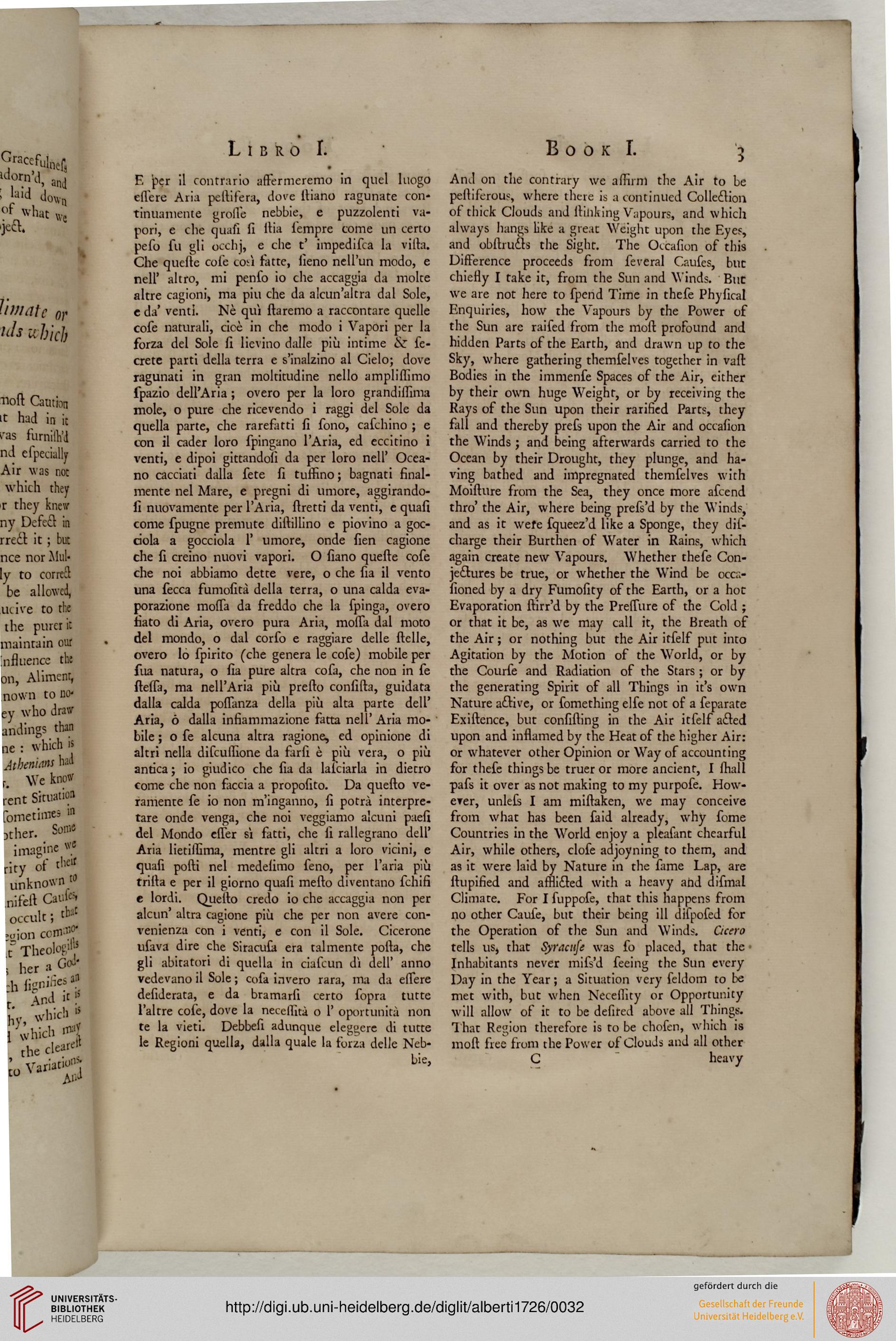Libro I.
E per il contrario affermeremo in quel luogo
ciYere Aria perlifera, dove Uiano lagunare con-
tinuamente grolle nebbie, e puzzolenti va-
pori, e elle cjuasì si llia tempre come un certo
peso su gli occhi, e che t' impedita la villa.
Che quelle cole co;ì fatte, sieno nell'un modo, e
nell' altro, mi penso io che accaggia da molte
altre cagioni, ma più che da alcun'altra dal Sole,
e da' venti. Né qui daremo a raccontare quelle
cose naturali, cicè in che modo i Vapori per la
forza del Sole si lievitici dalle più intime & se-
cretc parti della terra e s'inalzino al Cielo; dove
ragunati in gran moltitudine nello amplilsimo
spazio dell'Aria ; overo per la loro grandilTima
mole, o pure che ricevendo i raggi del Sole da
quella parte, che rarefatti si sono, casehino ; e
con il cader loro spingano l'Aria, ed eccitino i
venti, e dipoi gittandosi da per loro nell' Ocea-
no cacciati dalla sete li tuffino ; bagnati final-
mente nel Mare, e pregni di umore, aggirando-
si nuovamente per l'Aria, ilretti da venti, e quasi
come spugne premute diltillino e piovino a goc-
ciola a gocciola 1' umore, onde sien cagione
che si creino nuovi vapori. O siano quelle cose
che noi abbiamo dette vere, o che sia il vento
una secca fumosità della terra, o una calda eva-
porazione mona da freddo che la spinga, overo
fiato di Aria, overo pura Aria, morta dal moto
del mondo, o dal corso e raggiare delle slelle,
overo Io spirito (che genera le cose) mobile per
sua natura, o sia pure altra cosa, che non in sé
ilessa, ma nell'Aria più pretto consida, guidata
dalla calda portanza della più alta parte dell'
Aria, ò dalla infiammazione fatta nell' Aria mo-
bile ; o sé alcuna altra ragione, ed opinione di
altri nella disculìione da farli è più vera, o più
antica ; io giudico che sia da lalciarla in dietro
come che non faccia a proposito. Da quello ve-
ramente sé io non m'inganno, si potrà interpre-
tare onde venga, che noi reggiamo alcuni paeli
del Mondo ert'er si fatti, che si rallegrano dell'
Aria lietiilàma, mentre gli altri a loro vicini, e
quasi porti nel medelimo seno, per l'aria più
trilla e per il giorno quasi mesto diventano schifì
e lordi. Quelto credo io che accaggia non per
alcun' altra cagione più che per non avere con-
venienza con i venti, e con il Sole. Cicerone
usava dire che Siracusa era talmente polla, che
gli abitatori di quella in ciaseun di dell' anno
vedevano il Sole ; cosa invero rara, ma da elsere
desiderata, e da bramarli certo sopra tutte
l'altre cose, dove la necelsità o 1' oportunità non
te la vieti. Debbesi adunque eleggere di tutte
le Regioni quella, dalla quale la forza delle Neb-
bie,
Book I. 3
And on the contrary we asfimi the Air to be
peiìifèrous, where there is a continued Collcflion
of thick Clouds and (linking Vapours, and which
always hangs like a great Weight upon the Eyes,
and obllrudls the Sight. The Occasion of this
Disference proceeds from several C.auses, but
chiefly I take it, from the Sun and Winds. But
we are not here to Iperici Time in these Physical
Enquiries, how the Vapours by the Power of
the Sun are raised from the moll profound and
hidden Parts of the Earth, and drawn up to the
Sky, where gathering themselves together in vail
Bodies in the immense Spaces of the Air, either
by their own huge Weight, or by receiving the
Rays of the Sun upon their ratified Parts, they
fall and thereby press upon the Air and occasion
the Winds ; and being afterwards carried to the
Ocean by their Drought, they plunge, and ha-
ving bathed and impregnated themselves with
Moillure from the Sea, they once more ascend
thro' the Air, where being press'd by the Winds,
and as it were squeez'd like a Sponge, they dis-
charge their Burthen of Water in Rains, which
again create new Vapours. Whether these Con-
jeftures be true, or whether the Wind be occa-
sioned by a dry Fumosity of the Earth, or a hot
Evaporation ilirr'd by the Prerture of the Cold ;
or that it be, as we may call it, the Breath of
the Air ; or nothing but the Air itself put into
Agitation by the Motion of the World, or by
the Course and Radiation of the Stars ; or by
the generating Spirit of all Things in it's own
Nature aflive, or something else not of a separate
Exiilcnce, but consisling in the Air itself ailed
upon and inssamed by the Heat of the higher Air:
or whatever other Opinion or Way of accounting
for these things be truer or more ancient, I shall
pass it over as not making to my purpose. How-
ever, unless I am mislaken, we may conceive
from what has been said already, why some
Countries in the World enjoy a pleasant chearful
Air, while others, close adjoyning to them, and
as it were laid by Nature in the same Lap, are
ifupified and affliGed with a heavy aiid dismal
Chinare. For I suppose, that this happens from
no other Cause, but their being ill dtsposèd for
the Operation of the Sun and Winds. Ciccio
tells us, that Syracnsi was so placed, that the ■
Inhabitants never miss'd seeing the Sun every
Day in the Year ; a Situation very seldom to be
met with, but when Nccellity or Opportunity
will allow of it to be desired above all Things.
That Region therefore is to be chofcn, which is
moll free from the Posver of ClouJs and all other
C heavy





